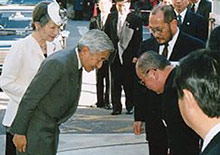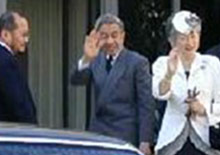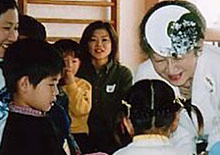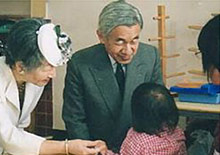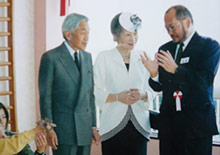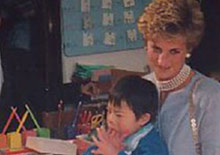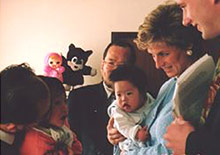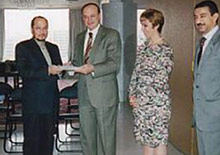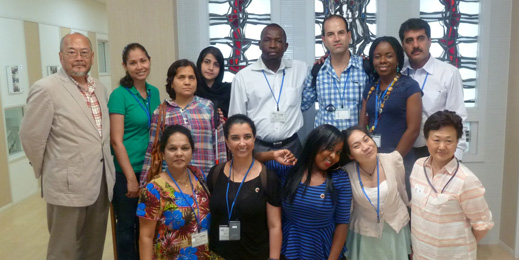UMEDA AKEBONO GAKUEN
“Umeda Akebono Gakuen” of Social Welfare Corporation “Karashidane” is a developmental support center, which was established by a German Jesuit minister Petro Heidrich in 1977 to provide developmental supports for children as well as supports for their families.
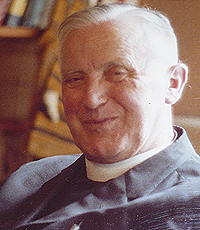
PETRO HEIDRICH
| Address | 7-12-15, Umeda, Adachi-ku, Tokyo, JapanZipcode:123-0851 |
|---|---|
| Phone | +81-3-3848-1190 |
| Fax | +81-3-3848-1191 |
| wing1@umeda-akebono.or.jp |
Special Thanks to Deborah Koehler & Sheila Goets who provided these English pages.
Umeda Akebono Gakuen “Center” was established by German Jesuit minister PETRO HEIDRICH in 1970 to support young children who had developmental special needs. He wanted to provide a structured and safe environment where the child’s potential could be actualized through the support to the family.
There are maximally 300 children under care at the “Center” with ages ranging from new-born to 6 years old. These 300 children are separated by needs into different programs. The first program, the Parent and Child Support Department (Shiteibi-Tsuen-Bu), has 104 regularly attending children who come to the “Center” with their mothers. Also another 17 children who are multi handicapped belong to this department. 55 children come to the Early Childhood Educaion Department (Mainichi-Tsuen-Bu) which is like to a regular child care center where they play in a classroom with other children. Another 150children attend the “Center” for specialized counseling and therapy as part of the Akebono Club. In addition, evaluation and services are available to families who may need advice or counseling on a short-term basis. The “Center” provides a full-range of support to children and families with differing needs.
The children are referred to the “Center” by the community health centers, child guidance centers, medical institutions, child care centers and other institutions where habilitation activities occur. Families who receive services through Shiiteibi-Tusuen-Bu and Mainichi-Tsuen-Bu are funded by Japan and Tokyo metropolitan governments. Children involved in Akebono Club and who receive other service are funded by private fees.
Our Staff & System
| profession | number of staff | profession | number of staff |
|---|---|---|---|
| President | 1 | Speech Therapist | 4(2) |
| Chaplain | (2) | Teacher | 1(2) |
| Pediatrician | 1 | TheraputicEducator | 3(1) |
| Nurse | 1 | Dietician | 1 |
| NursingTeacher | 3(3) | Cook | (2) |
| Occupational Therapist | 6(3) | Driver | 1 |
| PhysicalTherapis | 3 | Officeworker | 4 |
| Psychologist | 15(3) | Janitor | (1) |
| SocialWorker | 2(2) | ( ) Part-time employees |
April 1, 2014
1. Our important mission~philosophy and characteristic of our center
1) Three viewpoints
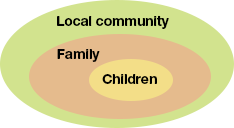
1,We provide individual developmental supports for each child.
2,We provide supports for families who raise children.
3,We value community net-working to sustain community living of children and families.
2) Characteristics
~Developmental support~
1,Developmental support from age 0
2,Services are for various developmental disabilities and conditions.
3,Support based on assessment
4,Individual services tailored for each child’s developmental needs (individual/group medical treatment and education)
5,Developmental support based on the latest and best theories and methodologies
6,Team approach including medical staff
7,Montessori educational system …support for individual activities toward independence
8,Integration …Regular and organizational interaction with the children in Umeda “Kodomonoie (children’s home)”
~Support for families~
1,Support to understand their children …From “ Acceptance of disabilities of their children” to “Acceptance of their children with disabilities”
2,Interactions among families, provision of learning opportunities
3,Respite …Provision of service which gives “a little breaking room”
~Community net-working~
1,Collaboration with institutions which children utilize
2,Dispatch of staff to local institution’s projects
3,Networking in the community by organizing “Adachi Children and Welfare Forum”
2. Support Services of Umeda Akebono Gakuen
Umeda Akebono Gakuen has three groups: Developmental Support Group, Community Support Group, and Service Management Group.
In the Developmental Support Group, children are provided with developmental support inside the Gakuen utilizing legal contracts.
1) Developmental Support Group
| Name | Fixed No. of participants | Target age group | Frequency | Days open | |
|---|---|---|---|---|---|
| Legal contracts | Parallel-use class for parent & child | Approx. 130 | 0 – 5 years | Once – 5 times/week | Mon. – Fri. |
| Everyday class | Approx. 65 | 2 – 5 years | 5 times/week | Mon. – Fri. | |
| Semimonthly rehabilitation class | Approx. 60 | 0 – 5 years | Twice/month | Mon. – Fri. |
[1] Parallel-use class for parent & child (Legal contract)
Children participate in the class with their parents for a maximum of five days based on the contract. In order to respond timely to the needs of each child, various support staff provide support through a team approach in the personal and group forms depending on the condition of the child and his/her family and their change based on the individuals’ support plan.
| Age group | Fixed No. of participants | No. of days | Support form | Major support contents |
|---|---|---|---|---|
| 0 – 5 years | Approx. 130 | Once – 5 times/week | Personal Group | * Parent and child class * Personal support by PT, OT, ST, psychologist, remedial education therapist, nursery teacher, and child care worker * Group support by the above staff * Collaboration with day-care center/kindergarten in which the children participate in parallel |
[2] Everyday class (Legal contract)
Only children receive rehabilitation services five days a week. Based on Montessori education, the children learn things mutually among themselves focusing on developing a sense of independence and the abilities for self-choice and self-determination. In addition, integrated education is given with children enrolled in the adjacent sister school (day-care center) and Umeda “Kodomonoie (Children’s home)” (130 children aged 1 to 5 years).
| Age group | Fixed No. of participants | No. of days | Support form | Major support contents |
|---|---|---|---|---|
| 2 – 5 years | Approx. 72 | 5 times/week | Group (6classrooms, 3groups) Personal |
* Children are separated from their parents * Group support and personal support given by the classroom teacher in Montessori classroom * Integrated education * Team approach: collaboration with PT, OT, ST, psychologist, orthoptist, physician, and nurse |
[3] Semimonthly rehabilitation class (Legal contract)
Children participate in the class twice a month with their parents.
| Age group | Fixed No. of participants | No. of days | Support form | Major support contents |
|---|---|---|---|---|
| 0 – 5 years | Approx. 60 | Twice/ month | Personal | * Parent and child class * Personal support by PT, OT, ST, psychologist, remedial education therapist, nursery teacher, and child care worker * Group support by the above staff * Collaboration with day-care center/kindergarten in which the children participate in parallel |
2) Projects of Community Support Group
The Community Support Group provides support to the related local facilities and organizations for the purpose of supporting children and their family living in the community utilizing childcare knowledge, skills, experience and information that the Gakuen has developed. The support services of the group include: consultation and support services to the day-care centers, kindergartens, schools, etc. in the community, participation in the project to introduce external experts to special schools, dispatch of mental health staff to municipal health centers, and consultation services, etc. in child-related centers in the community. The group also holds various seminars and workshops concerning childcare in the Gakuen for the local community people and delivers such seminars and workshops to the community.
In addition, the group provides After-school Day Service, Akebono Club, developmental support in the Learning Support Class, and support services by Visiting Day-care Center, etc.
| Name | Fixed No. of participants | Target age group | Frequency | Days open | |
|---|---|---|---|---|---|
| Legal contracts | After-school Day Service | 10 children per day | 1st – 3rd graders | 10 times/ year | Mon. – Sat. |
| Support Service by Visiting Day-care Center, etc. | 0 year olds – 3rd graders | Once – 5 times/month | Mon. – Sat. | ||
| Non-legal contract | Akebono Club | 0 – 5 year olds | 20 times/ year | Sat. | |
| Learning Support Class | 1st – 3rd graders | 10 times/ year | Mon. – Sat. |
[1] After-school Day Service (Legal contract)
Primary school children who require developmental support are provided with personal/group rehabilitation care.
Placing importance on the children’s developmental support, childrearing support for their family, and living support in the school and community, the group supports the children’s growth together with their guardians.
[2] Support Service by Visiting Day-care Center, etc. (Legal contract)
In this project, experts visit day-care centers and schools to provide support services when children who enroll or are going to enroll in day-care centers, etc. require specialist support for adapting smoothly to group living. This project is provided in accordance with the Child Welfare Act.
[3] Akebono Club and Learning Support Class (Non-legal contract)
In these projects, developmental support is provided under free contracts independently of the act. The Akebono Club targets pre-school children, and the Learning Support Class targets primary school children.
3) Support of Service management group
Service management group provides services while monitoring Developmental support group’s developmental support services in terms of contents, timing and consistency.
Assessment
Developmental evaluation, exercise, evaluation of sensory integration, etc.
Family support
Consultation, making friends, study meeting, etc. .
School support
Information provision, study meeting, collaboration with schools
Collaboration with institutions for parallel use
Information exchange by visits and written reports, etc.
School lunch and dietary education
Nutrition, dietary behavior, manner, food culture
Consultation
Welfare consultation by case workers, etc.
Respite
Service for “take a short break”
☆ Consultation
To provide better supports, staff including section chief other than the assigned staff is involved in medical treatment and education, and review the contents and methods with parents/guardians from different point of views.
3. Umeda Akebono Clinic
This clinic is located on the 2nd floor of the memorial hall. A full-time pediatrician and a nurse provide health support for children and collaborate with medical institutions.
4. Social welfare corporation “Karashidane” and 2 nurseries
1) The meaning of “Karashidane”
Karashidane means “seeds of mustard”, taken from a passage in the Bible.
“The kingdom of heaven is like unto a grain of mustard seed, which a man took, and sowed in his field: which indeed is less than all seeds: but when it is grown, it is greater than the herbs, and become the tree, so that the birds of the heave come and lodge in the branches thereof.”
(The Gospel According to St. Matthew, Chapter 13, 31-32)
Wishing those small children and their families to become persons who support others, and hoping Umeda Akebono Gakuen, Umeda “Kodomonoie (Children’s home)” and Adachi Aoi nursery to become a peaceful sanctuary for children and their families, we named our corporation “Karashidane”.
2) Umeda “Kodomonoie (Children’s home)”
This nursery, established in 1965, is the first nursery following Montessori methods in Japan. It is located next to a park. At the 4th floor of the memorial hall, a sister nursery “Nijinoheya (Rainbow room)” is located. Umeda Akebono Gakuen was built in this place to be integrated with Umeda “Kodomonoie (Children’s home)”.
3) Adachi Aoi nursery
Adachi Aoi Nursery is operated by “Social welfare corporation Karashidane” as designated administrator. It is located in front of Aoi station of Tsukuba Express line.
